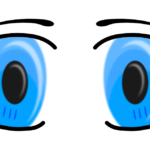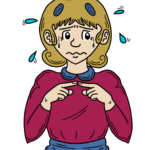Graves’ Disease- Hyperthyroidism

Autoimmune disease that affects the thyroid gland. The thyroid gland is overstimulated and produces excessive amount of thyroid hormone.








- Changes in menstrual cycle
- Eye lid retraction
- Enlarged, palpable thyroid
- Unstable emotional state
- Again, weight loss despite increased appetite
- Simply, high metabolic rate
- High T3 and T4
- High free T4
- Decreased TSH
- Radioactive iodine uptake test >50%

Thyroid Storm can occur due to infection/stress
- palpitations
- severe tachycardia
- severe nausea and vomiting
- increased agitation
- fever
- delirium
- coma
- Thyroidectomy
- Radioactive Iodine Therapy to destroy damaged tissue
- Antithyroid medications
Betablockers such as propanalol to lower heart rate and BP
Propylthiouracil or Methimazoles
- Block thyroid hormone
- Major side effect: Agranulocytosis– monitor CBC and s/s of infection
- Major side effect: liver disease (s/s dark urine, clay colored stools, pruritis, upper right quad pain)
- Increase anticoagulant effects (heparin and warfarin).
- Often given with Iodine preparations
Lugol’s solution
- Iodine preparation that temporary suppresses thyroid hormone release.
Oral Radioactive Iodine
- Goal is to accumulate in thyroid and destroy it.
- Increased fluids since excreted in urine
- Use safety precaution since radioactive
- Side effect: bone marrow suppression
- Monitor vitals signs: Client is hypertensive and tachycardic
- Promote relaxation in a nice, cool, quiet, dim-lighted environment
- Moisten eyes due to exophthalmus (artificial tears)
- Tylenol to control fever
- IV fluids to prevent dehydration
- Needs a frequent high-caloric diet due to hypermetabolic state
- Avoid stimulants such as coffe
- Avoid foods containing Iodide (unpredictable effect on thyroid)- milk products & sea fish.
- Respiratory: keep tracheotomy and suction equipment at the bedside. Assess for respiratory distress such as noisy breathing.
- Check for bleeding and/or hematoma formation
- May be swallowing difficuties.
- Watch for thyroid storm such as elevation in temperature
- Keep semi-fowler’s position
- Monitor for hypocalcemia since parathyroid may have been damaged accidentally (hypocalcemia=tetany)
- Will need life-long thyroid replacement
Critical Thinking Exercise 1
You know that the client understands the plan of care when she states… Click on the right answer
No! Foods high in iodide are contraindicated in people with Graves’ Disease. Iodide causes the thyroid gland to make more thyroid hormone. I know, it is confusion since Iodine is used to supress the thyroid. But the mechanism of how Iodine works is not fully understood.
Yes!. Agranulocytosis, the reduction of a type of WBCs, can occur with PTU leading to infection. Teach the client to report s/s of infection and monitor CBC.
Critical Thinking Exercise 2
The client’s breathing is very noisy. What is the most important intervention you can do for this patient?
No! You will notify the surgeon, but the first priority is to have the tracheotomy tray at the bedside. Airway swelling post thyroidectomy is a possible complication. To ventilate client, an emergency tracheotomy may be needed.
Yes! This is the priority. The first intervention.
No! This is not what would help the client the most. If the client is having trouble breathing due to airway swelling, it is the tracheotomy that will save the client, not the blood gas.
